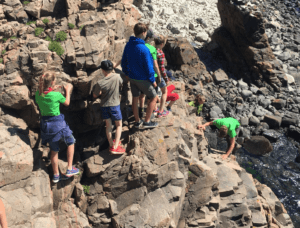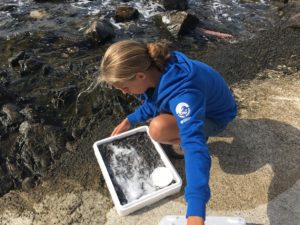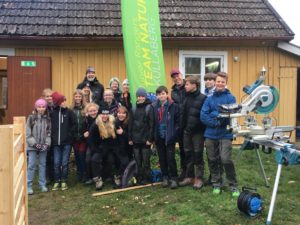Junior Ranger Case Studies: Kullaberg Nature Reserve
Excursion to explore life on the beach.
To provide guidance and information on how to run the Junior Ranger programme, EUROPARC started to gather case studies describing how the programme is structured and managed in different parks.
These case studies, in form of short interviews, are mainly intended to provide inspiration and ideas to Protected Areas willing to start the programme.
About Junior Ranger Kullaberg
Kullaberg Nature Reserve started the Junior Ranger Programme in 2012 and in 2014 the local scout group was asked to join it. In the first years, the programme consisted mainly of scouts doing volunteer work during the summer, helping the park management and at the visitor centre.

Exploring the cliffs and caves of Kullaberg.
The good thing about cooperating with the scouts is that we reach many young people. The hard part is distinguishing the Junior Ranger work from the ordinary scout activities. “When am I a Junior Ranger and when am I a scout?”
How are your activities organised?
In the last two years Kullaberg Junior Rangers have organised Junior Ranger weeks in the summer – five day-camps led by a mentor and focusing only on the EUROPARC Junior Ranger programme to distinguish it from the scout activities. Every week included parts of learning about nature and the PA, doing practical work and nature conservation and of course having fun.
Our activities include work in the nature reserve, nature conservation, beach cleaning events as well as bird watching, bat excursions and workshops.
Over the rest of the year Junior Ranger activities take place more or less every month. Some are included in the scout program, while some are not. These activities include work in the nature reserve, nature conservation, beach cleaning events as well as bird watching, bat excursions and workshops. There is also a weekend Junior Ranger camp in the nature reserve.
How do you recruit young people? How many Rangers/Mentors are involved and how many Junior Rangers?
We have recently started working on opening up the group so that more can join. As well as not all scouts are interested in being Junior Rangers, of course there are also young people who would like to be a Junior Ranger without being a scout. Contacts have been made with a network of nature science teachers in the area to promote the programme in their schools.

Kullaberg Junior Rangers releasing glass eel in the marine nature reserve.
We will also use social media to attract more young people with the goal of having 20 junior rangers and 20 volunteer rangers. We are aiming to start a Youth+ programme next fall. All this will require more rangers/mentors involved than there is today.
What are the main results and benefits for young people and for the Protected Area?
The participation in the Junior Ranger programme provides knowledge about the PA, extends the young people’s network and gives them new skills in presentation and much more. The exchange camps have been arranged to provide the young people with a wider network and enhance their feeling of engagement and understanding of EUROPARC on a broader perspective.

Preparations to build a shed for firewood at a popular campsite where the Kullaberg Junior Ranger team previously has built a fireplace and removing old insecure fireplaces.
What are the main costs and how do you finance them?
The main costs are connected to providing the Junior Ranger groups with the mentor for the summer day-camps as the mentor is not employed by the park. We strongly believe that it is necessary to have the mentor at all times during the camps to provide a necessary continuity for the young people.
There are also some costs connected to arranging exchange camps. Due to lack of funding we do not have as much equipment (bat detectors, binoculars etc.) as we would like to but we are trying to get money from different foundations that may be prepared to support the Junior Ranger work.
Do you also want to share your experience with running the Junior Ranger Programme in your park? We will be happy to spread your ideas around – just drop us a mail: f.minozzi@europarc.org
